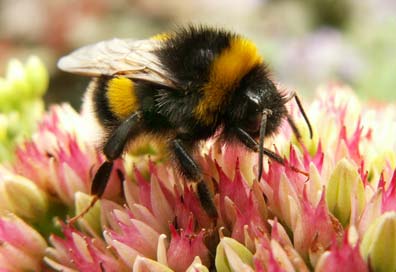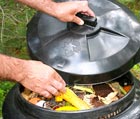- Gardening Tips |
- | What's NEW! |
- | Contact Us |
- | Sitemap
Ants and Bees and Worms...Oh My!
"HELP! I have ants and bees and worms...all over my garden! What do I do?"
Sometimes beginning gardeners are concerned that they may have a problem with the creatures they encounter while playing in the dirt.
So first, let's determine if you really do have a problem or are those ants or bees or worms actually a necessary part of a healthy garden area?
First off, ask yourself, "Are the ants and bees and worms...or any one group of them...covering everything in the garden and threatening to take over the house?"

If the answer is yes, then truly, you may have a "problem" and you may have a real need to contact your local Pest Control people before the creatures do manage to take over your house and home.
However, if you answered no, then quite possibly the ants and bees and worms are probably just doing their respective jobs and it's perfectly fine for some of them to be in your garden areas.
In fact, they may even be doing you a favor by hanging out in your garden areas. "How so?" you ask.
Suppose you have Trillium or Corydalis in your garden. In order to produce more of these beautiful flowers in your garden areas, you'll need the help of the ant.
The ant comes looking for food, finds the Trillium or Corydalis seed a yummy treat and moves it to its nest.
After the ants eat the part that has attracted them, they take the remainder of the seed part to their waste disposal area (which is full of nutrient rich ant debris) where the seeds then germinate. Voila'...more Trillium or Corydalis plants grow in your garden.
Okay...so the ants may be alright then. But what about the bees? Bees in the garden are scary; after all, they do sting people.
Well, you may need to understand a little about your flowers in order to see their connection to the bees and a reason to allow bees as visitors to your garden.
In order for you to have beautiful blooms next year, some of your flowers may need to be pollinated.
Perfect or complete flowers have both male and female parts. The pollen produced by the male flower part must be transferred to the female flower part.
This transfer is called pollination. Like the ants, the bees are simply out gathering food (nectar and pollen from flowers) for their own use.
The fact that they cross-pollinate the flowers in your garden in the process is entirely secondary to their search for food.
Okay...so the ants and bees can stay, but the worms...YUCK! They're slimy and...YUCK! Well, in all actuality, the worms may be the hardest working of all three of these garden creatures.
The worms feed on decomposing organic matter at the surface of your soil.
They then go about burrowing deeply throughout your garden areas leaving channels in your soil. This channeling breaks up dirt clods, allows air in and water to enter and drain away.
As the worms burrow and digest, they also eliminate at the lower depths in your soil thus providing nutrients for your plants at their roots and amending or improving your garden soil overall.
By understanding the roles that ants and bees and worms play in your garden will help you to learn to welcome these creatures as hard-working helpers and gardening friends.
Re-print Permission
The article featured on this page may be reprinted, subject to the Article Resource and Live Link as seen below being displayed prominently.
Links may open in a new window but must NOT have a "no-follow" attribute.
ARTICLE RESOURCE: Gardening Quick n Easy.com
More Gardening Articles
To Top of this Ants and Bees and Worms page
Return to Gardening Tips Home Page
Gardening Updates
Note: We'd love you to send us your favorite garden pics to feature on our new pages!
Contact Us and we'll send you an email address that can accommodate your photographs.

